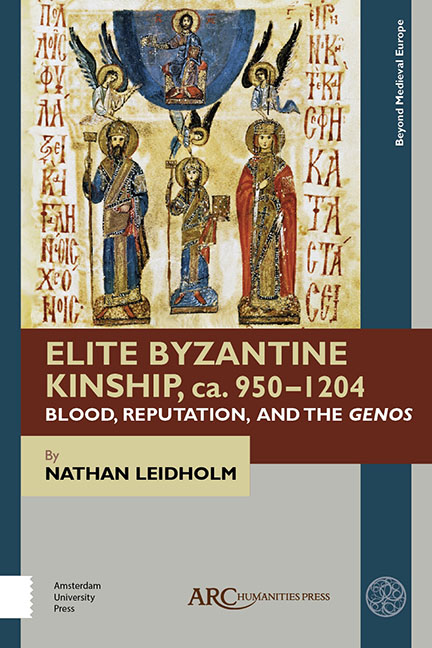Book contents
- Fronrtmatter
- Contents
- List of Abbreviations
- Abbreviation
- Acknowledgements
- Introduction
- Chapter 1 Defining “the Family” in Byzantine Sources and the Modern Historiography
- Chapter 2 The Language of Kinship
- Chapter 3 Marriage Impediments and the Concept of Family
- Chapter 4 Interrogating Consanguinity in a Byzantine Context
- Chapter 5 Family Names and the Politics of Reputation
- Chapter 6 Kinship and Political Developments of the Eleventh and Twelfth Centuries
- Conclusion
- Select Bibliography
- Index
- Fronrtmatter
- Contents
- List of Abbreviations
- Abbreviation
- Acknowledgements
- Introduction
- Chapter 1 Defining “the Family” in Byzantine Sources and the Modern Historiography
- Chapter 2 The Language of Kinship
- Chapter 3 Marriage Impediments and the Concept of Family
- Chapter 4 Interrogating Consanguinity in a Byzantine Context
- Chapter 5 Family Names and the Politics of Reputation
- Chapter 6 Kinship and Political Developments of the Eleventh and Twelfth Centuries
- Conclusion
- Select Bibliography
- Index
Summary
THE PREVIOUS PAGES have shown that it is possible to define the genos in such a way that is broadly consistent with Byzantine sources and that this definition, however imperfect, allows for a greater degree of precision in modern studies of Byzantine kinship and society. Changes in the vocabulary of kinship between the ninth and thirteenth centuries attest the central place of the genos in the Byzantine understanding of kinship, and its importance steadily increased over this time. The genos was the principal form of the singular family in questions of marriage law, and debates in marriage law in eleventh-and twelfth-century Byzantium were framed as debates over the nature of the genos itself. The increased role of the genos corresponded with a renewed interest in the ties of blood, which was itself related to the greater role of genealogical ties as determining factors in social standing from the mid-eleventh century. The heritable surname was perhaps the single most important development for the aristocratic genos in the period covered in this study. The surname, as the outward marker of one's genos, encapsulated the family's reputation and was more likely than most other properties to survive intact from one generation to the next. The power of the family name could even outlast the social or political relevance of members of the genos itself.
The genos was not an amorphous, poorly defined “extended family” in medieval Byzantium. Sources of diverse genres across the entire period covered by this study offer a relatively clear definition of the kin group, which is broadly consistent across time and space. Yet this does not mean that the genos did not alter in form or function over the period covered by this book. Rather, the concept remained stable in its most fundamental aspects, while change occurred in the precise role it played in the political and social lives of the Byzantine elite and its relative importance in society more broadly.
The Byzantine genos was the expression of the consanguineous family, effectively immune to changes or additions through means other than biological reproduction. This includes the act of marriage, in which each spouse maintained their identity as members of their natal genos even as their union marked the beginning of a new genos (after the birth of their children).
- Type
- Chapter
- Information
- Elite Byzantine Kinship, ca. 950–1204Blood, Reputation, and the Genos, pp. 163 - 168Publisher: Amsterdam University PressPrint publication year: 2019

